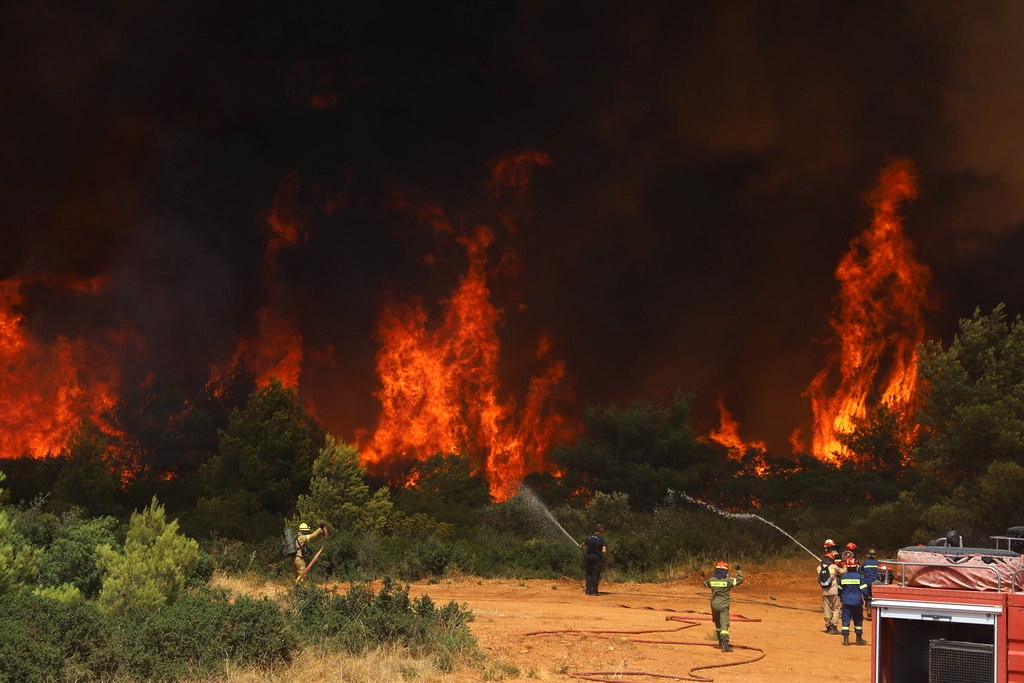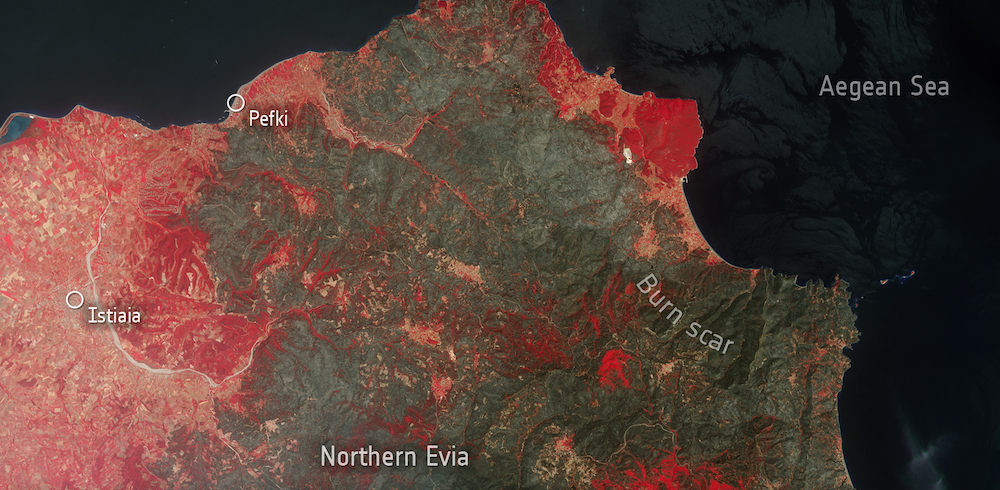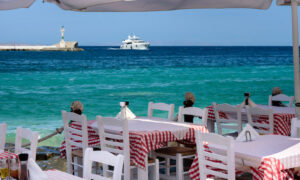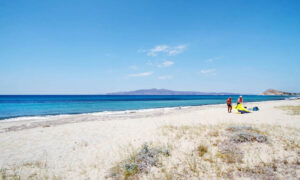(Editor’s note: This is Pt. 2 of a two-part series about the effects of climate change in Greece. See Pt. 1 here.)
A nation that destroys its soils destroys itself. Forests are the lungs of our land, purifying the air and giving fresh strength to our people. (President Franklin D. Roosevelt)
In Pt. 1 of this post, I wrote about Greek wildfires, the public’s reactions, a changing climate and housing concerns. In this part, I will cover my recent experiences, the floods following the flames and what we can do as individuals and societies ….
Fire loop
Summers in Greece are starting to feel a bit like the classic ’90s movie “Groundhog Day” in which a weatherman finds himself in a time loop. When the weather gets hot and we have a windy day, we hear about several recycling centers and/or unofficial dumping grounds for old tires and junk catching on fire. These fires are followed by lots of noxious smoke and anger, with talking heads shouting over each other on TV and the radio about who is to blame, with nothing ever being resolved.
These fires always take place in populated areas, they happen every summer and no one is every held to any safety standards in order to prevent them in the future.
After hearing about these smallish local fires, we start to hear about blazes starting here and there, often with two or three fronts breaking out near each other within minutes. This happens regularly around the country in our dwindling green areas.
The blame game continues, the fires rage and then subside and little changes until the next summer season, which is longer than it ever was.
It’s not uncommon anymore ….
Something I noticed when catching up with family or friends about how their summer went is that the fires played a role in almost every conversation. “Oh, no, so you were near the X fire! Did you have smoke?’ or “Oh, so you stayed near where there were fires last year, did you see the burnt areas?’ or “We had to go home a few days early because there was a fire nearby,” and so on. Now after the floods, those come up in the same sort of conversations.

Our experience
This past July, my family and I wound up on vacation in northwestern Evia, a huge island just east of Athens which runs along mainland Greece. We went with friends from abroad for a weeklong holiday. This previously verdant area – made magical by its proximity to the sea – was devastated by enormous fires in the summer of 2021. The fires in many instances went right down to the water (pine trees are notoriously flammable) and many residents have complained bitterly that they were largely left on their own to save their homes and businesses, many of which did not survive the horrific blazes.
Rumors abound about the area being earmarked for mass tourism due to its long beautiful beaches, while others say that they fear their communities will become part of the “Batteries of Europe,” areas with high concentrations of wind turbines and solar panels.
I wish I could say that we purposely chose to go to northern Evia in order to support struggling locals as they work hard to re-build their lives and livelihoods in an area which will never be the same after the fires. However, the truth is that our family friends from abroad made a last-minute plan to go there, booked, and invited us along.
When I mentioned that the area had pretty much been incinerated two years ago, they had no idea – neither the booking site or the hotel staff they spoke to before arrival mentioned it. My first instinct was to encourage them to go elsewhere. The idea of having a holiday in a burnt area seemed unthinkable but it is becoming an increasing reality as a look at the fire maps of recent years prove.
After some discussion, we all decided to go anyway, hoping that it would provide a teaching experience and not a traumatizing one for our young children and that it wouldn’t be too depressing for us adults. It was indeed sad and shocking to drive through the burnt areas on our way to the seaside village, but it also made all of us more grateful for every single tree that had survived and every green bush that had popped up, giving us signs of hope.
Our children thoroughly enjoyed a sunset beach walk with the rescue horses of Rancheros, where they also learned about what happened on the farm during the fires, both the good and the bad. We heard stories of kindness and solidarity – the messages were certainly not all doom and gloom.
After the fires, floods
This past week, large parts of central, eastern and western Greece have seen torrential downpours from Storm Daniel which dumped more rain than ever before recorded within a 24-hour period in Greece. The result was horrific flooding which washed away crops, cars, motorcycles and even some bridges and buildings.
A number of villages have essentially been submerged, with many residents awaiting rescue on their rooftops for 48 hours or more – a fact which has shocked and horrified many. There have been a number of deaths reported and some people are still officially missing. Traffic between Athens and Thessaloniki (Greece’s second-largest city) was even temporarily suspended this week due to flooding on the highway.
Southern Greece has also had some water damage and even here in the capital we had quite a bit of flash flooding, power cuts, downed trees and damage to homes and metro stations due to the heavy rainfall, which was accompanied by gale-force winds. This weather, contrasted with the uncharacteristically high temperatures and the smoky air of recent weeks, has left residents all over the country reeling.
The tap water has now been cut off in some of the flooded areas because the river overflowed into water tanks and pumping and filtration systems have been damaged. “Water water everywhere,/Nor any drop to drink” as Coleridge once wrote.
Of course, as with every time we see extreme flooding, there are questions about where the money – which was supposed to go to flooding prevention measures – has gone. Some critics say the government has once again given out contracts without accountability. Areas with less trees (for example, after forest fires) are more prone to floods and the vicious chain of destructions continues with little or no mitigation in many cases.
Climate change appears to be here in full force (as it is in lots of other places as well), affecting human life, livestock, crops, trees and so on in more ways than we ever imagined, as one thing always links to another. which links to another in every eco-system.
Many voices have been urging us for years to protect our natural environments in both legal and practical ways. None of us who live in Greece can any longer turn a blind eye to this issue. The landscape is scarred in so many areas all over the country, the sea is much warmer than it used to be and regularly pushes out plastics and other undesirable debris. Some parts
of our beautiful nation are becoming both inhospitably hot and charred and unsightly, which
breaks my heart.
What can we do?
We all know that there are a gazillion little things we can do, from limiting or eliminating our non-essential air travel to reusing and recycling and making sustainable food choices. However, last year the world saw a record number of private jet flights and polluting industries are making record profits and putting out harmful chemicals and gasses in record quantities. This is all despite being told by the world’s leading climate scientists that the time is now or never to limit the global warming which is already wreaking havoc.
No one wants dead seas, charred forests or burnt or flooded crops, but what are we doing to prevent these growing problems? Yes, individual lifestyle changes can make a difference but we need systemic changes to travel, industry and agriculture in order to significantly reduce the negative outcomes predicted by top climate scientists from all over the world.
It’s time to push our governments to take care of the planet for us all living today and for future generations. Some say that all we can do now is our best to mitigate the effects as much as possible, while others still hold hope we can keep dangerous warming down if we act quickly and decisively.
Whatever the case, we need to act. “There is no Planet B” as Rob Newman said to the world in 2007 at Heathrow Climate Camp.
Earth is our only home.
Educate yourself and others, using these or some of the many other credible sources available online which are full of useful information.
Potential solutions:
• Why many top scientists are risking their freedom and careers
• Ending reliance on fossil fuels – the Natural Resources Defense Council
• What can I do to help? – Greenpeace
• For locating active fires and previously-burnt areas, Copernicus is an invaluable resource:
For flood awareness visit:
• Copernicus
• The European Flood Awareness System
––––––––––
For more about Greece, see Dispatches’ archives here.
Read more from Christina here.
A Pittsburgher by birth, Christina T. Hudson is also half Greek and has – so far – spent most of her life in Athens, the chaotic but captivating capital city of Greece.















